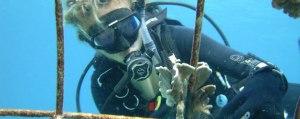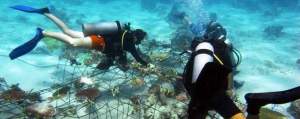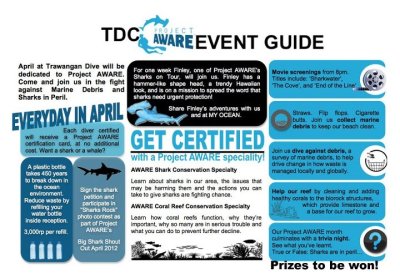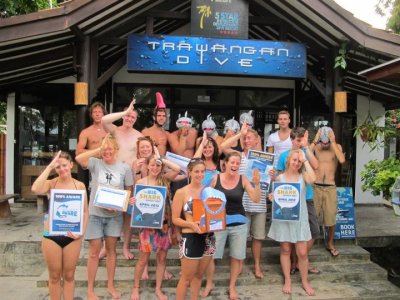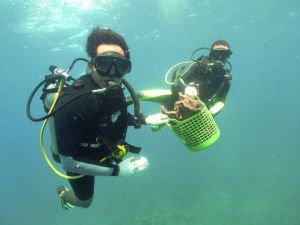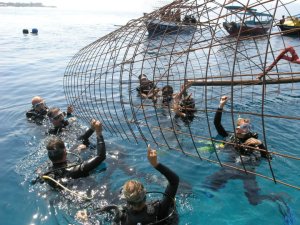Trawangan Dive is proud to be hosting part of the 2012 Biorock training workshop. It will bring professional coral restoration experts and lecturers into the classroom to engage participants in all aspects of coral reef restoration using the definitive Biorock method.
Coral reefs are the rainforests of the world’s oceans. Just like their earthly counterparts, they occur in tropical and sub tropical environments and support a huge variety of species. They are also diminishing at an alarming rate.
Decline of the Great Barrier Reef
A study published just a few weeks ago revealed that Australia’s Great Barrier Reef has lost more than half its coral cover in the past 27 years. Researchers analysed data on the condition of 217 individual reefs that make up the World Heritage Site. The results show that coral cover declined from 28.0% to 13.8% between 1985 and 2012. They attribute the decline to storms, a coral-feeding starfish and bleaching linked to climate change.
Asia’s Coral Triangle is also under threat
Another report has warned that more than 85 percent of reefs in Asia’s Coral Triangle are directly threatened by human activities such as coastal development, pollution and overfishing. Launched at the International Coral Reef Symposium in Cairns, it said the threat was substantially more than the global average of 60 percent and urged greater efforts to reduce destructive fishing and run-off from land.
“When these threats are combined with recent coral bleaching, prompted by rising ocean temperatures, the percent of reefs rated as threatened increases to more than 90 percent,” the report said.
The Coral Triangle covers Indonesia, Malaysia, Papua New Guinea, the Philippines, The Solomon Islands, and East Timor and contains nearly 30 percent of the world’s reefs and more than 3,000 species of fish.
Marine biologists are trying reverse the trend
Marine biologists across the world are desperately trying to protect our remaining reefs. Some are building repositories of the known coral species so that future generations can at least get to see them in aquariums. Others are constructing artificial reefs in areas of significant damage.
Biorock method yields quick results
The biorock method was developed by architect and marine scientist Wolf Hilbertz and marine biologist Tom Goreau. They found that by running a small electrical current through a structure in seawater, a hard shell of calcium carbonate would form on the cathode. You could then attach small pieces of natural coral to the structure. The corals seemed to love these substrates, achieving growth rates often five times faster than normal.
Gili Trawangan – a paradise under threat
Gili Trawangan is one of three tiny coral atolls off the coast of Lombok, Indonesia. It is increasingly a compulsory side trip to any Bali holiday, thanks to its white beaches, diving and snorkelling sites and absence of motor vehicles.
The Gili Islands are dependent on a healthy marine habitat for their fisheries, tourism, shore protection and marine biodiversity. This habitat has been largely damaged by combinations of coral heatstroke, disease, storms, global sea level rise, over-fishing and direct physical damage from destructive fishing practices, boats, anchors and tourists.
Without large-scale restoration of degraded habitats to make them capable of supporting larger fish and shellfish populations, there will be fewer fish in the future.
And without healthy growing corals, there will be fewer beaches or tourism income, affecting all business owners on the island.
Tourist attraction
“Right now we around 60 biorock structures around this island,” says Delphine Robbe. “By the end of this year, we should have one hundred.” Since coming to Gili Trawangan in 2005 with a plan to get her PADI Divemaster certification, this Frenchwoman has become the driving force behind the island’s many eco programmes.
Besides stimulating biodiversity, the Biorock structures also combat beach erosion, which became a serious problem with the destruction of the natural reefs. Increasingly, they are an attraction for tourists too. Divers and snorkelers can now see underwater sculptures of a manta ray, trident, dolphin, turtle, octopus, snake, moon and even a komodo dragon.
2012 Biorock training workshop
Gili Trawangan is proud to be hosting the 2012 Biorock training workshop. It will bring professional coral restoration experts and lecturers into the classroom to engage participants in all aspects of coral reef restoration using the definitive Biorock method.
Workshop sessions will cover all aspects of theory and practice including design, construction, installation, monitoring, maintenance and repair of Biorock sites. Additional lectures will cover the basic principles of coral reef ecology, threats to coral reefs, and environmental restoration.
Over the course of the seven day workshop, participants will have the opportunity to use their knowledge as they plan and invoke all the steps involved in constructing, deploying and populating Biorock structures with coral fragments.
After accomplishing the Biorock workshop, certified PADI instructors can apply to PADI to be able to teach the PADI Distinctive Specialty: Introduction to Biorock process.
If you’d like more information about the Biorock workshop and ways in which you can combine the course with PADI professional courses, please contact us at Trawangan Dive.
This article originally appeared on http://www.idc-gili.com
